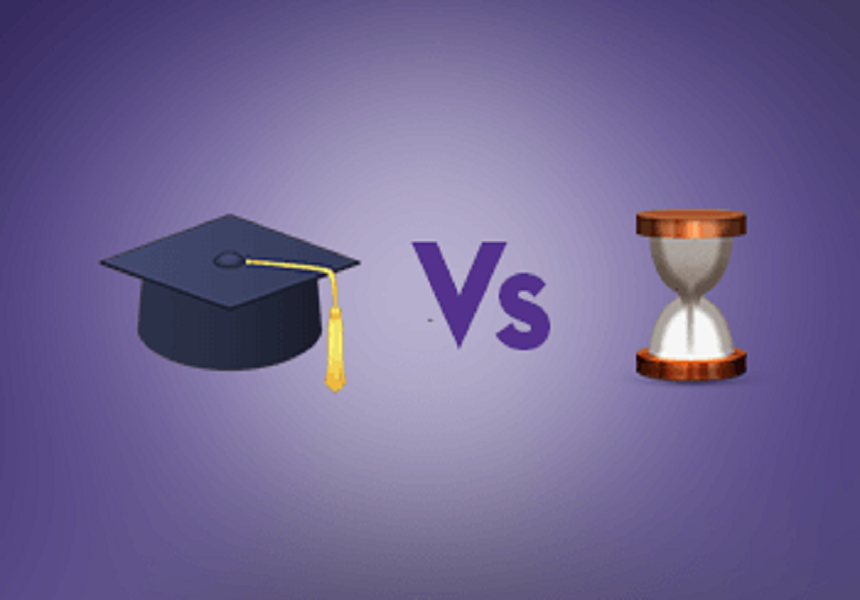The Debate: Education vs Experience | Which Gets The Job?
A lot depends on your profession and where you are in your career.
What matters most when securing a job is a question as old as higher education itself. Does a higher degree help you get a job, or does your previous work experience matter more? Will your experience or education help you stay employed, advance in your profession, and earn a solid living for decades to come, in addition to merely getting a job? This is what the evidence indicates.
Many students are torn between continuing their studies after graduation or applying for a job and gaining valuable field experience. Students are often put off by the growing emphasis on entrepreneurship and practical, real-world experience. Both of these features are critical to your journey and have advantages and downsides that vary depending on various situations. Let's take the Education vs. Experience debate a step further and see who gets the job and whether the experience is more essential than academic qualifications.
The University Dean vs The Entrepreneur
If you're starting in the workforce or considering a career shift, you may be wondering whether expertise is more valuable than a degree or vice versa. Is it too late if you don't have what you need? Let's have a look at what we've got.
A university dean would sit you down and explain why earning a degree is essential. Many professions, such as medicine, law, and engineering, require it, and you'll see it listed as 'preferred' on many job advertisements. So, what is the purpose of education? According to the dean, it gives you transferable skills such as research, analysis, and time management. Employers will see that you can absorb material and learn quickly if you have a degree.
Let's start by looking at why employers prefer college degrees. They frequently link persons with degrees (and, more significantly, four-year degrees) with the following characteristics:
The ability to assess problems, conduct research, and come up with answers has been demonstrated.
A demonstrated capacity to learn complicated, challenging material
They have demonstrated that they are motivated and driven.
Intelligence proof
Improved interpersonal abilities
More reputable credentials
However, education has become increasingly expensive and requires a certain length of time that some students consider unnecessary, resulting in fewer admissions to higher education.
On the other hand, a self-made entrepreneur would tell you that experience is crucial. They claim that if you start working right after school, you'll learn on the job and obtain three or more years of industry experience than university graduates. When it comes to career advancement, recruiters will notice that you have the determination to succeed, which means it will take less time to train – or 'on-board – you to be work-ready.
Plus, if you've worked in a field for a few years, it demonstrates your dedication – and that you won't leave after a year. The principle of 'learning by doing is still valued around the world. Experimentation and experience have spawned a slew of successful careers. An individual with remarkable talent and motivation, and tremendous work is required for a career to thrive solely on this basis. Because professional occupations necessitate developing from the ground up, people on this path have a greater sense of ownership and responsibility for their decisions, making them outstanding leaders.
So Does Experience Trump Academic Qualifications?'
Another competing point arises from the discussion over education vs. experience: is an experience more essential than academic qualifications? Instead of pitting experience and education against one another, the solution to this problem is to perceive them as complements. To begin any entry-level career, you will require a baseline education, which might range from high school graduation to a bachelor's degree. Thus, you can only pursue work experience after receiving a primary education and then decide whether your industry requires you to obtain a better higher qualification or learn on the job.
Major arguments on this topic include:
A higher educational qualification provides you with a specific skill set that you may then turn into a work skill to help you advance in your career.
Higher education can assist you in finding the ideal employment to utilize your skills, which professional exposure may not always ensure because you will have to try and work on a trial and error basis.
Gaining professional achievement through work experience will undoubtedly be more valuable than obtaining a successful academic record through college. Professional experience will always be valued over academic qualifications and theories in the actual world.
Work experience may not always provide you with the skill set you need to succeed in your field; this can only be learned over time.
Academic achievement, not occupational success, is shown by a higher educational qualification.
The two journeys function differently for everyone depending on the person's aptitude, personality, and surroundings. Education will never be dismissed, and experience will always have the upper hand. Your actions have long-term consequences; therefore having a mentor or educational counselor to help you is crucial.
Key Takeaways:
The correlation between educational achievement and earnings is strong, with greater degrees often resulting in higher incomes.
Unemployment rates are lower for workers with a higher level of education.
Higher education is particularly crucial for persons just starting out in their careers. Job experience and learning new abilities might become increasingly important as you progress.
Simply, basic education is a great start. But theories alone won't suffice in dominating the market. However, know what you want to do, seek opinions, do your own research, and strive to be the best at what you do. Being the best is the common factor in any field to boost your value.
Cheers!
PS: Confused on how to write the perfect CV, Resume, or Cover Letter? Try MY CV Creator Today!









